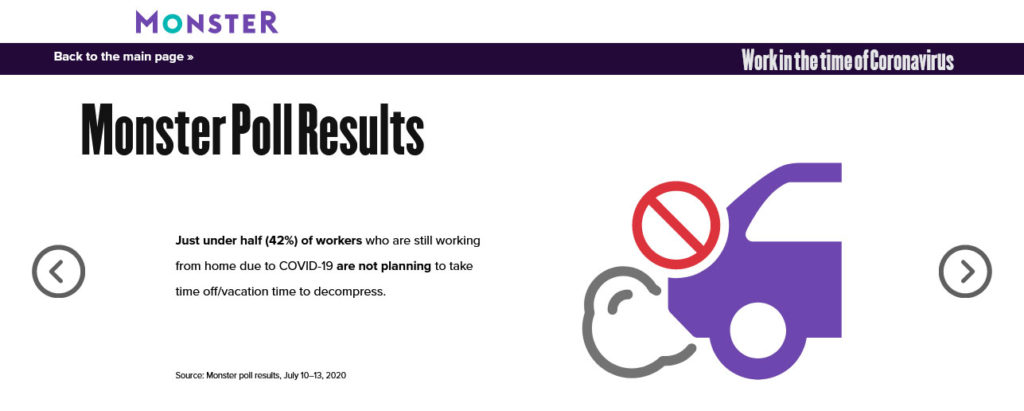The share of people working remotely and from their home office have skyrocketed during the COVID pandemic. This definitely had some positive impact on work culture and is something that the majority of people want to continue. At the same time, something that’s also on the rise is home office burnout.
How can that be?
Well, despite what companies feared, remote workers actually work more at home. On average an extra three hours per day. In addition, besides the usual work stressors (not to mention, feelings of insecurity while experiencing a global pandemic), working from home and the pandemic-imposed isolation add another factor to the mix: loneliness.

In fact, social isolation has been shown to reduce life expectancy by up to 15 years and is actually as bad as smoking 15 cigarettes a day. Who would have thought being around other people is important for your wellbeing? Shocker!
So, besides everything else, the global breakout of coronavirus is also part of what fuels the work-from-home burnout epidemic. Especially since, for a long time, there was no end in sight.
In order to help you stave off the home office blues or recover if you are already experiencing burnout symptoms, in this post we will talk how to recognize home office burnout as well as give you tips for recovery.
Work-From-Home Burnout: Symptoms and Warning Signs
Burnout can come with a whole range of negative medical outcomes. From high blood pressure and heart disease over a weakened immune system to anxiety, depression, and even death (which is, you know, kind of the worst possible outcome). Here’s how to tell if you are on the way to burnout city:
- Work avoidance — Procrastinating, an unwillingness to start your to-do list, being late to meetings, and doing whatever you can to do anything but work don’t mean you lack work ethic. They can also be a warning sign that you are simply overtaxed and burnout is around the corner. This goes especially for people who usually don’t have a problem staying motivated.
- Inability to disconnect from work — Funny enough (well, maybe funny isn’t the right word), the opposite can also be true. Working more than usual, checking emails after hours, not taking time off, and overall being too committed to work can also be a sign of burnout. If all of your thoughts circle around the grind, it might be a sign that you are using work as a means to avoid things that aren’t working in your life and that home office burnout has taken over.
- Declining performance — If your work quality is in decline, you lack creativity and motivation to do well, that can be a sign that stress has taken over your brain and you simply can’t cope anymore.
- Exhaustion and lack of motivation — Feeling constantly tired? Is the weekend not enough to recover and refuel? This can be a sign of burnout. Especially if it extends to activities you usually enjoy like hobbies, being social, and other pleasant pursuits.
- (Mental) health struggles — Burnout is basically a chronic form of fatigue. It can come with all sorts of health and mental health issues. Examples include depression, feelings of irritability or hopelessness, and anger. But also poor sleep, insomnia, headaches, pain, more frequent illness, or digestive problems.
- Coping in unhealthy ways — It’s fine to relax with a glass of wine after work every now and then. However, if you find yourself increasingly numbing your feelings with alcohol, drugs, or medication, that’s also sign that your life is out of balance.
The problem with working from home is also that you might not have anyone around who notices these changes in your behavior. Especially if you are living alone, it’s up to you to diagnose when something has gone awry and demands action.
In addition, if you are not living alone, being burned out makes it much harder to take care of those who might depend on you. You can’t give to others if you have nothing left. So, you are not doing them a favor by sacrificing yourself either.
Tips to Recover from Home Office Burnout
If you suspect that work-from-home burnout has taken hold, here are a few pointers to help you right the ship.
1. Take Care of the Basics
As we have covered in our article on how to take care of your mental health during lockdown, struggles like burnout and other health problems are also a matter of self care. If you are not feeling well, the first step is to try and make sure to give your body what it needs:
- Sleep enough, ideally 7-9 hours per day
- Stop using devices late at night
- Avoid junk food and try to eat healthy
- Establish some sort of movement routine like walking, running, stretching, yoga, etc.
- Invest in social contact, preferably (safely) off screen
It’s much easier for your mind to recover when your body is taken care of, so make it a priority. The article linked above has more tips for that.
2. Disconnect
When the office is in your home, it can be harder to make the distinction between home and work life. In a usual 9-to-5 job, you leave work where it belongs: the office. There are clear boundaries between the two spaces (at least, in an ideal world). When working from home, it’s not always that easy, which is how burnout can sneak in.
The solution: set boundaries as if you are still going to office. That means, set and adhere to office hours. Silence any notifications and set out-of-office messages outside of that so as not to get sucked back in. And especially don’t work on weekends!
In addition, consider taking a lunch break away from your computer and don’t react to work-related inquiries during that time. You might also consider working in “sprints” of an allotted time and regularly take breaks in between (see Pomodoro technique or the 90/20 rule).

Furthermore, it can help to create a designated work area, preferably in a separate room that is not your living room or bed room. That makes it easier to “leave” work — when you can physically walk away from it.
You might also try to have work and normal clothes. Switching wardrobe can be helpful in switching the roles associated with them. Think about it: Usually, you would put on work attire in the morning and change into something more comfortable when you come back home. There’s no reason why you can’t do that in your own home either.
You might also consider creating a faux commute. Walk around the block once while listening to radio or whatever you usually do while going to the office. This also has the added benefit of giving you exercise and fresh air.
In the end, it’s about setting boundaries and adhering to them. Make sure to communicate your new work hours to clients and coworkers in advance to make this easier.
3. Delegate What You Can
If you are feeling like there is too much to do and incapable of doing it all, there might be simple solution: don’t.
What do I mean? Simple, see what you can offload to somebody else. If you are feeling swamped at work, see if you can ask someone to take over some of your duties.
This goes for your personal life as well. Look into ways to eliminate tasks from your to-do list at home. Just because you are present, that doesn’t mean you have to do it all yourself.
Order groceries to be delivered to your house, hire a house cleaner who follows proper pandemic protocols, find a daycare or babysitter, or do whatever else you can to exchange money for time.
You might also communicate with your spouse. Maybe you can divide household chores differently or see if they can pick up the slack for a while.
4. Prioritize Work Stuff You Like
Working from home can easily turn into the same old same old – a daily slog through conferences, emails, and video calls. With nothing else going on, the busy work can bury stuff that actually makes you excited about your career.
If that’s the case for you, it’s time to carve out some space and time for more inspirational tasks. Figure out what gives you fuel and fire to do your work, then block time to do it. Try to remember what attracted you to your career in the first place. Then find ways to make that a bigger priority.
If there is project that excites you, you can ask your manager to be assigned to it. Same with stuff that really isn’t in your wheelhouse, it might be good to ask if you can be left out. If the work you do is more meaningful to you, it can help you get motivated and feel better.
5. Communicate Your Struggles
When not in the office and only seeing people occasionally on screen, it can be hard for others to notice that things aren’t going well for you mentally or physically. In those cases, it can be a good idea to communicate this to your coworkers and/or superiors. Just being aware of it can help them make changes in order to support you more.

This can also be an entry point into a conversation about how the workload or processes can be structured differently. Maybe there is a way to reduce the workload, make more space for less drudge work, or redefine your job description and the scope of the work you do (do more meaningful work, remember?). Here, having a concrete proposal makes it easier for coworkers and superiors to respond and say yes.
Sharing what’s going on might also simply open up avenues for more communication and ways to connect. With vaccinations on the rise and COVID restrictions falling in many countries, some of that might even be possible offline and in real life (at a distance, of course).
However, sharing your struggles doesn’t have to happen only in the context of work. If you are not feeling well, talking about those feelings with friends, family, loved ones, or even a professional can help alleviate the burden. It might also lead to some insights on how to get better.
6. Take Time Off
Even though people are working more, they are taking less time off. No wonder so many are feeling burned out!

If this is a factor in your feelings of home office burnout, there’s just one solution: take more time for yourself. This can mean scheduling some personal time each day doing something you enjoy and that takes your mind off of work.
But, it also means that you should use your vacation days. Yes, it is a global pandemic, yes, you might not be able to go on vacation. But that doesn’t mean that taking time off work isn’t going to benefit you, whether as one large chunk of holiday or a spread-out long weekends.
Especially when you reside in this murky gray area of work/home life, it can be important to cut the former out for a while. Completely disconnect, avoid checking emails and other notifications, and get in touch with yourself again.
Pursue some hobbies, safely interact with friends and loved ones, take walks, and do whatever helps you not think about work. It might even give you the clarity of mind to find and implement more proactive ways to prevent work-from-home burnout in the future.
Home Office Burnout: Take It Seriously Before It Gets Serious
Work-from-home burnout is a real concern, especially with the recent shift in work during the pandemic. As many benefits as a home office offers, it also blurs the lines between work and personal life, making it harder to separate the two.
If you are finding yourself exhibiting signs of being burned out at home, it’s time to take action. Being alone also means being more responsible for and to yourself. Listen to your body and mind and any warning signs to take control of the situation before it becomes untenable.
Hopefully the recovery tips above can be a gateway to find your way back from home office burnout or stave it off in the first place.
Have you struggled with work-from-home burnout during the pandemic? What has helped you get better? Share your tips in the comments!
Image sources: Fernando @cferdo/Unsplash, sketchplanations, Finn/Unsplash

No Comments
Start the conversation